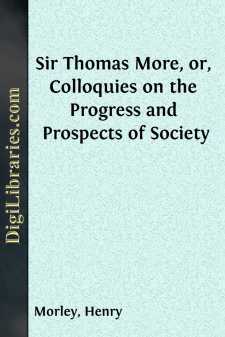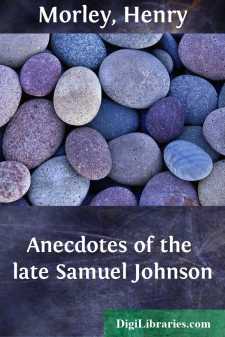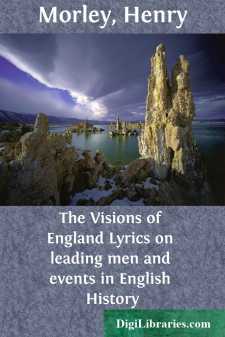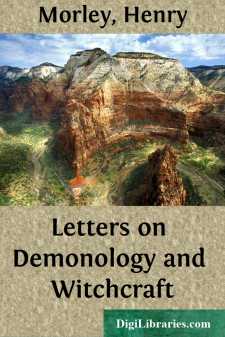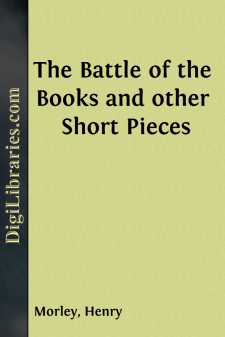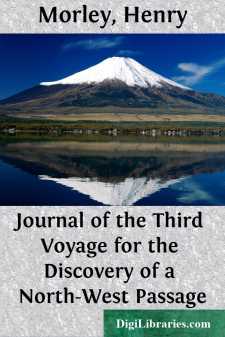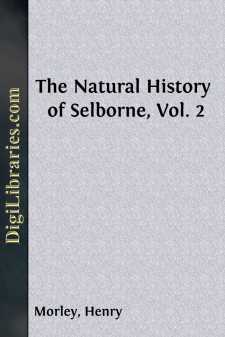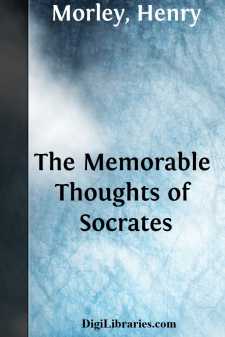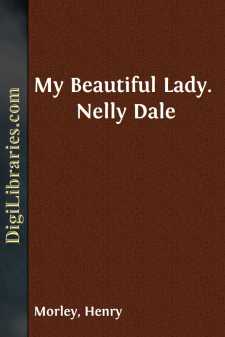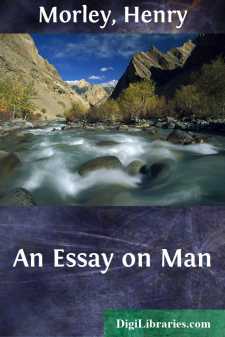Categories
- Antiques & Collectibles 13
- Architecture 36
- Art 48
- Bibles 22
- Biography & Autobiography 813
- Body, Mind & Spirit 142
- Business & Economics 28
- Children's Books 13
- Children's Fiction 10
- Computers 4
- Cooking 94
- Crafts & Hobbies 4
- Drama 346
- Education 46
- Family & Relationships 57
- Fiction 11828
- Games 19
- Gardening 17
- Health & Fitness 34
- History 1377
- House & Home 1
- Humor 147
- Juvenile Fiction 1873
- Juvenile Nonfiction 202
- Language Arts & Disciplines 88
- Law 16
- Literary Collections 686
- Literary Criticism 179
- Mathematics 13
- Medical 41
- Music 40
- Nature 179
- Non-Classifiable 1768
- Performing Arts 7
- Periodicals 1453
- Philosophy 64
- Photography 2
- Poetry 896
- Political Science 203
- Psychology 42
- Reference 154
- Religion 513
- Science 126
- Self-Help 84
- Social Science 81
- Sports & Recreation 34
- Study Aids 3
- Technology & Engineering 59
- Transportation 23
- Travel 463
- True Crime 29
Henry Morley
Henry Morley was a 19th-century British academic and writer, best known for his contributions to literature and education. He was a professor of English literature at University College London and authored numerous works, including biographical studies and literary criticism. Morley played a pivotal role in popularizing English literature through his editorial work on the influential "Cassell's National Library" series.
Author's Books:
Sort by:
by:
Henry Morley
It was in 1824 that Robert Southey, then fifty years old, published “Sir Thomas More, or Colloquies on the Progress and Prospects of Society,” a book in two octavo volumes with plates illustrating lake scenery. There were later editions of the book in 1829, and in 1831, and there was an edition in one volume in 1837, at the beginning of the reign of Queen Victoria. These dialogues with a...
more...
by:
Henry Morley
INTRODUCTION Mrs. Piozzi, by her second marriage, was by her first marriage the Mrs. Thrale in whose house at Streatham Doctor Johnson was, after the year of his first introduction, 1765, in days of infirmity, an honoured and a cherished friend. The year of the beginning of the friendship was the year in which Johnson, fifty-six years old, obtained his degree of LL.D. from Dublin, and—though he...
more...
by:
Henry Morley
INTRODUCTION. Again, on behalf of readers of this National Library, I have to thank a poet of our day—in this case the Oxford Professor of Poetry—for joining his voice to the voices of the past through which our better life is quickened for the duties of to-day. Not for his own verse only, but for his fine sense also of what is truest in the poets who have gone before, the name of Francis Turner...
more...
by:
Henry Morley
INTRODUCTION. Sir Walter Scott's "Letters on Demonology and Witchcraft" were his contribution to a series of books, published by John Murray, which appeared between the years 1829 and 1847, and formed a collection of eighty volumes known as "Murray's Family Library." The series was planned to secure a wide diffusion of good literature in cheap five-shilling volumes, and...
more...
by:
Henry Morley
Jonathan Swift was born in 1667, on the 30th of November. His father was a Jonathan Swift, sixth of the ten sons of the Rev. Thomas Swift, vicar of Goodrich, near Ross, in Herefordshire, who had married Elizabeth Dryden, niece to the poet Dryden’s grandfather. Jonathan Swift married, at Leicester, Abigail Erick, or Herrick, who was of the family that had given to England Robert Herrick, the...
more...
by:
Henry Morley
INTRODUCTION. William Edward Parry, the son of a physician, was born at Bath in December, 1790. At the age of thirteen he was entered as a first-class volunteer on board the flag-ship of the Channel fleet, and after seven years’ service and careful study of his profession he obtained a commission in 1810 as lieutenant in the navy. He was then at once, aged twenty, sent to the Arctic seas, where...
more...
by:
Henry Morley
INTRODUCTION. Gilbert White’s home in the quiet Hampshire village of Selborne is an old family house that has grown by additions, and has roofs of nature’s colouring, and creeping plants on walls that have not been driven by scarcity of ground to mount into the air. The house is larger, by a wing, now than when White lived in it. A little wooded park, that belongs to it, extends to a steep...
more...
by:
Henry Morley
INTRODUCTION. This translation of Xenophon’s “Memorabilia of Socrates” was first published in 1712, and is here printed from the revised edition of 1722. Its author was Edward Bysshe, who had produced in 1702 “The Art of English Poetry,” a well-known work that was near its fifth edition when its author published his translation of the “Memorabilia.” This was a translation that...
more...
by:
Henry Morley
INTRODUCTION. “A ray has pierced me from the highest heaven—I have believed in worth; and do believe.” So runs Mr. Woolner’s song, as it proceeds to show the issue of a noble earthly love, one with the heavenly. Its issue is the life of high endeavour, wherein “They who would be something moreThan they who feast, and laugh and die, will hearThe voice of Duty, as the note of...
more...
by:
Henry Morley
Pope’s life as a writer falls into three periods, answering fairly enough to the three reigns in which he worked. Under Queen Anne he was an original poet, but made little money by his verses; under George I. he was chiefly a translator, and made much money by satisfying the French-classical taste with versions of the “Iliad” and “Odyssey.” Under George I. he also edited Shakespeare, but...
more...


